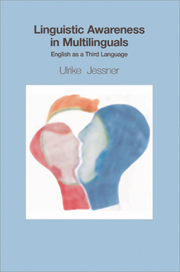Book contents
- Frontmatter
- Contents
- List of figures and tables
- List of abbreviations
- Acknowledgements
- Introductory remarks
- 1 Multilingualism with English
- 2 Learning and using a third language
- 3 On the nature of linguistic awareness
- 4 Exploring linguistic awareness in third language use
- 5 Crystallizing linguistic awareness in multilingual education
- 6 Envoi
- References
- Index
2 - Learning and using a third language
Published online by Cambridge University Press: 05 September 2013
- Frontmatter
- Contents
- List of figures and tables
- List of abbreviations
- Acknowledgements
- Introductory remarks
- 1 Multilingualism with English
- 2 Learning and using a third language
- 3 On the nature of linguistic awareness
- 4 Exploring linguistic awareness in third language use
- 5 Crystallizing linguistic awareness in multilingual education
- 6 Envoi
- References
- Index
Summary
In this chapter the psycholinguistic aspects of the acquisition and use of a third language will be discussed. For a long time linguists have treated third language learning as a by-product of research on second language learning and acquisition. But nowadays it is known that learning a second language differs in many respects from learning a third language.
This chapter will focus on the development of research on multilingualism, in particular on current approaches taken in studies which have concentrated on the detection of differences between second and third language acquisition (SLA and TLA henceforth). The main areas of research in the fields of TLA and multilingualism, such as the effects of bilingualism on third language learning, will be discussed in more detail. Subsequently the importance of metalinguistic awareness in multilingual proficiency as one of the emerging cognitive factors will be highlighted.
DIFFERENT PERSPECTIVES
The learning and acquisition of a third language has for a long time been subsumed under research on second language learning and acquisition. For instance, Sharwood Smith (1994: 7, italics in original) defined second language in the following way:
‘Second’ language will normally stand as a cover term for any language other than the first language learned by a given learner or group of learners a) irrespective of the type of learning environment and b) irrespective of the number of other non-native languages possessed by the learner. This includes both ‘foreign’ languages (for example, French for Austrians) and languages which are not one's mother tongue but are nevertheless spoken regularly by one's own community (for example, French for English-speaking Canadians).
- Type
- Chapter
- Information
- Linguistic Awareness in MultilingualsEnglish as a Third Language, pp. 13 - 35Publisher: Edinburgh University PressPrint publication year: 2006



